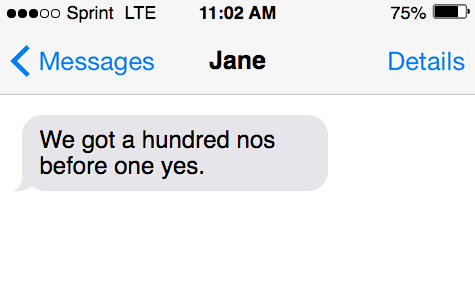What is the plural of the word “no?” Using the apostrophe in the English language typically provides pluralization to the word that it is modifying. Adding an apostrophe can suggest that there is possession. And many amounts of certain things. For example, “Sonia’s book is missing.” In this sentence, the possession of the book is to Sonia, the person. This is how an apostrophe can modify singular nouns. An apostrophe can also modify compound nouns and create joint or separate possession.
Learn which word form is correct in this short guide…
Why is there confusion between no’s, noes, and nos
The word “no” can get pluralized in the English language quite often. For example, “They said there was one hundred nos before they got one yes.” This is a sentence that describes how many of the “no” remarks someone got before they received one yes.
In addition, the word “No” is used as an abbreviation for the word “number.” Making it even more confusing when learning English for the first time. For example, “No. 3770” is a format someone could see on a buildling.
How to use the apostrophe correctly
The possessive singular noun is made by adding an apostrophe and the letter “s” to the singular noun in question, regardless of whether the singular noun ends in an “s” letter.
When a plural noun has an “s” at the end, the possessive form of the noun is created by simply adding an apostrophe. When the noun ends in any other letter, the possessive form is made by adding both an apostrophe and an “s.”
| Form | Example |
| Singular noun | Sarah’s |
| Plural noun | Women’s |
| 2 or more people | Kim and Adam’s |
| Singular noun ending in “s” | James’s and James’ |
| Plural noun ending in “s” | Parent’s |
| 2+ people | Kim’s and Adam’s |
| Apostrophe for Possessives | Apostrophe for Contractions |
| Amy’s swim class | they + have = they’ve |
| Karen’s car | are + not = aren’t |
| Robert’s vehicle | they + will = they’ll |
“No” definition
Let’s take a look at the definition of “no.”
| Word | Definition |
| No (determiner) /ˈ/nō/ | not any. |
Which is correct? Thank yous or thank you’s or thank-you’s?
Here is a simple breakdown of which word form is correct. For examples of each word form in an English sentence, scroll down to the next section.
| Word | Correct or incorrect |
| Nos | Correct |
| Noes | Correct, although not commonly used in Modern English |
| No’s | Incorrect as this is showing possession, when it doesn’t need to |
Key differences
In the above examples, the word “nos” and “noes” are the correct forms to use when trying to pluralize the word form and determiner “no.” For example, someone received a bunch of no’s? Or did they receive a bunch of nos? Technically, the word “nos” would be correct.

“Nos” sentence examples
Below are sentence examples using the word form correctly:
- We received on hundred nos before we got one yes. It is pivotal for our business.
- Learning how to raise money is difficult. You will get hundreds of nos before you get one yes. It is daunting and difficult.
How to remember which word form to use
Remember that we only use an apostrophe + “s” when we are trying to show possession over another noun. And since this is a determiner (in most cases), it would be incorrect to pluralize it is in this form. Instead, we only ad an “s” to the end of the word.
Here is a simple trick to remember apostrophe rules:
Use apostrophe + “s” with nouns that don’t end in “s”. When a singular noun has possession over another noun (such as Sarah’s hat or mom’s cat), add an apostrophe + “s” to the end of the noun. The same rules apply for collective nouns and plural nouns that don’t end in the “s” letter.
Common questions
Questions and answers about the English language.
How should I use the word “no’s” in this sentence: how many no’s before a yes?
The correct spelling in this sentence would be “how many nos before a yes.”
Inside this article
Fact checked:
Content is rigorously reviewed by a team of qualified and experienced fact checkers. Fact checkers review articles for factual accuracy, relevance, and timeliness. Learn more.
Core lessons
Glossary
- Abstract Noun
- Accusative Case
- Anecdote
- Antonym
- Active Sentence
- Adverb
- Adjective
- Allegory
- Alliteration
- Adjective Clause
- Adjective Phrase
- Ampersand
- Anastrophe
- Adverbial Clause
- Appositive Phrase
- Clause
- Compound Adjective
- Complex Sentence
- Compound Words
- Compound Predicate
- Common Noun
- Comparative Adjective
- Comparative and Superlative
- Compound Noun
- Compound Subject
- Compound Sentence
- Copular Verb
- Collective Noun
- Colloquialism
- Conciseness
- Consonance
- Conditional
- Concrete Noun
- Conjunction
- Conjugation
- Conditional Sentence
- Comma Splice
- Correlative Conjunction
- Coordinating Conjunction
- Coordinate Adjective
- Cumulative Adjective
- Dative Case
- Determiner
- Declarative Sentence
- Declarative Statement
- Direct Object Pronoun
- Direct Object
- Diction
- Diphthong
- Dangling Modifier
- Demonstrative Pronoun
- Demonstrative Adjective
- Direct Characterization
- Definite Article
- Doublespeak
- False Dilemma Fallacy
- Future Perfect Progressive
- Future Simple
- Future Perfect Continuous
- Future Perfect
- First Conditional
- Irregular Adjective
- Irregular Verb
- Imperative Sentence
- Indefinite Article
- Intransitive Verb
- Introductory Phrase
- Indefinite Pronoun
- Indirect Characterization
- Interrogative Sentence
- Intensive Pronoun
- Inanimate Object
- Indefinite Tense
- Infinitive Phrase
- Interjection
- Intensifier
- Infinitive
- Indicative Mood
- Participle
- Parallelism
- Prepositional Phrase
- Past Simple Tense
- Past Continuous Tense
- Past Perfect Tense
- Past Progressive Tense
- Present Simple Tense
- Present Perfect Tense
- Personal Pronoun
- Personification
- Persuasive Writing
- Parallel Structure
- Phrasal Verb
- Predicate Adjective
- Predicate Nominative
- Phonetic Language
- Plural Noun
- Punctuation
- Punctuation Marks
- Preposition
- Preposition of Place
- Parts of Speech
- Possessive Adjective
- Possessive Determiner
- Possessive Case
- Possessive Noun
- Proper Adjective
- Proper Noun
- Present Participle
- Prefix
- Predicate



